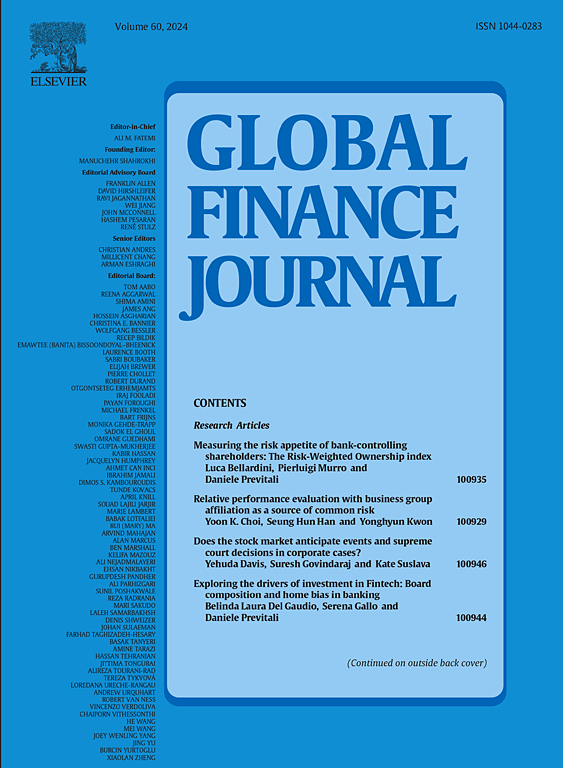Digital economy, official promotion pressure, and firm innovation
IF 5.5
2区 经济学
Q1 BUSINESS, FINANCE
引用次数: 0
Abstract
Currently, China's economic cycle is experiencing instability, and the pressure for economic growth is increasing. The digital economy is crucial for China's economic breakthrough and industrial transformation. Literature generally suggests that the digital economy can boost the economy at the macro level and improve the total factor productivity (TFP) of firms at the micro level. The significant role of the digital economy in promoting firm technological innovation highlights the importance of studying its impact on firm innovation. Using microdata from China's listed companies from 2013 to 2022 and meso data from prefecture-level cities, this paper innovatively incorporates the unique factor of official promotion pressure in China into the analytical framework, and empirically analyzes the impact of the digital economy on firm innovation and its underlying mechanisms using a panel model. The results show: (1) The digital economy effectively promotes firm innovation, and this conclusion holds after a series of robustness tests. (2) Official promotion pressure plays a key role in the digital economy's impact on firm innovation. The greater the promotion pressure on local officials, the more the digital economy fosters firm innovation. (3) The impact of the digital economy on firm innovation is heterogeneous. It significantly promotes innovation in large firms, emerging firms, eastern regions, and regions with a good business environment. However, its impact on small firms, established firms, central and western regions, and regions with poor business environments is weak or insignificant. (4) Mechanistically, the digital economy primarily promotes innovation by affecting firms with large financing scales and low levels of R&D investment. This paper recommends optimizing the performance appraisal system for local officials, formulating region-specific policies, and promoting the deep integration of the digital economy with firms to enhance their innovation capacity.
数字经济、官员晋升压力与企业创新
当前,中国经济周期不稳定,经济增长压力加大。数字经济是中国经济突破和产业转型的关键。文献普遍认为,数字经济可以在宏观层面上促进经济发展,在微观层面上提高企业的全要素生产率。数字经济对企业技术创新的推动作用凸显了研究其对企业创新影响的重要性。本文利用2013 - 2022年中国上市公司微观数据和地级市中观数据,创新性地将中国官员晋升压力这一独特因素纳入分析框架,运用面板模型实证分析了数字经济对企业创新的影响及其深层机制。结果表明:(1)数字经济有效促进企业创新,经过一系列稳健性检验,这一结论成立。(2)官方晋升压力在数字经济对企业创新的影响中起关键作用。地方官员的晋升压力越大,数字经济对企业创新的促进作用越大。(3)数字经济对企业创新的影响具有异质性。显著促进了大企业、新兴企业、东部地区和营商环境好的地区的创新。但对小企业、老牌企业、中西部地区和营商环境较差地区的影响较弱或不显著。(4)从机制上看,数字经济主要通过影响融资规模大、研发投入水平低的企业来促进创新。本文建议优化地方官员绩效考核体系,制定因地制宜的政策,推动数字经济与企业深度融合,提升企业创新能力。
本文章由计算机程序翻译,如有差异,请以英文原文为准。
求助全文
约1分钟内获得全文
求助全文
来源期刊

Global Finance Journal
BUSINESS, FINANCE-
CiteScore
7.30
自引率
13.50%
发文量
106
审稿时长
53 days
期刊介绍:
Global Finance Journal provides a forum for the exchange of ideas and techniques among academicians and practitioners and, thereby, advances applied research in global financial management. Global Finance Journal publishes original, creative, scholarly research that integrates theory and practice and addresses a readership in both business and academia. Articles reflecting pragmatic research are sought in areas such as financial management, investment, banking and financial services, accounting, and taxation. Global Finance Journal welcomes contributions from scholars in both the business and academic community and encourages collaborative research from this broad base worldwide.
 求助内容:
求助内容: 应助结果提醒方式:
应助结果提醒方式:


